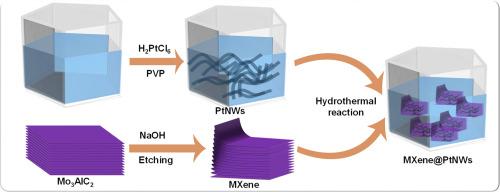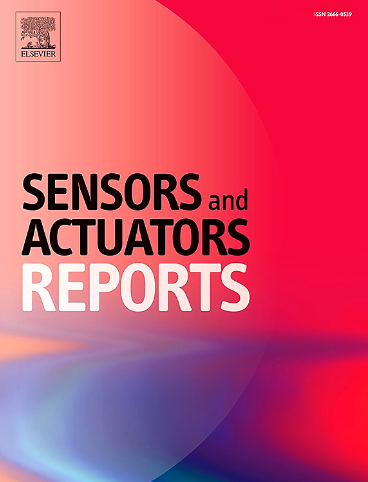超灵敏工程二维金属碳化物晶体管生物传感器,用于通过外泌体miRNA分析进行即时肺癌诊断
IF 7.6
Q1 BIOTECHNOLOGY & APPLIED MICROBIOLOGY
引用次数: 0
摘要
用于检测肺癌关键生物标志物外泌体MicroRNA-21 (miR-21)的超灵敏生物传感平台的开发仍然是即时诊断的重大挑战。在这里,我们提出了一种基于金属碳化物(MXene)的二维场效应晶体管生物传感器(pt - mx - ifet),采用铂纳米线(ptnw)设计,以实现卓越的导电性和跨导性。这种新型金属碳化物结构能够在0.84 fM下进行超低浓度miR-21检测,是迄今为止报道的最敏感的生物传感平台之一。PtNWs@MXene优越的性能源于其独特的形态和增强的电荷转移特性,促进高亲和力miRNA捕获和信号放大。在临床验证中,Pt-MX-iFETs与定量PCR具有良好的相关性(R²=0.8529),能够成功地将肺癌患者与健康对照组区分开来(p = 0.000139)。受试者工作特征(ROC)分析进一步证实了诊断有效性,AUC为0.904,特异性为81.8%,敏感性为81.9%。我们的研究结果强调了基于金属碳化物的生物传感前所未有的灵敏度,能够在复杂的生物流体中可靠地检测外泌体miRNA。随着进一步的临床验证,pt - mx - ifet在早期肺癌筛查、实时疾病监测和精确治疗指导方面具有革命性的潜力,为超灵敏、便携式诊断系统建立了一个新的范例。本文章由计算机程序翻译,如有差异,请以英文原文为准。

Ultrasensitive engineered two-dimensional metal carbide-based transistor biosensor for point-of-care lung cancer diagnosis via exosomal miRNA profiling
The development of ultrasensitive biosensing platforms for detecting exosomal MicroRNA-21 (miR-21), a critical biomarker for lung cancer, remains a significant challenge in point-of-care diagnostics. Here, we present a two-dimensional metal carbide (MXene)-based field-effect transistor biosensor (Pt-MX-iFETs), engineered with platinum nanowires (PtNWs) to achieve exceptional electrical conductivity and transconductance. This novel metal carbide architecture enables ultralow-concentration miR-21 detection at 0.84 fM, representing one of the most sensitive biosensing platforms reported to date. The superior performance of PtNWs@MXene stems from its unique morphology and enhanced charge transfer properties, facilitating high-affinity miRNA capture and signal amplification. In clinical validation, Pt-MX-iFETs demonstrated favorable correlation with quantitative PCR (R²=0.8529) and successfully discriminated lung cancer patients from healthy controls (p = 0.000139). Receiver operating characteristic (ROC) analysis further confirmed diagnostic efficacy, yielding an AUC of 0.904, with 81.8 % specificity and 81.9 % sensitivity. Our findings highlight the unprecedented sensitivity of metal carbide-based biosensing, enabling reliable exosomal miRNA detection in complex biofluids. With further clinical validation, Pt-MX-iFETs hold transformative potential for early lung cancer screening, real-time disease monitoring, and precision therapy guidance, establishing a new paradigm for ultrasensitive, portable diagnostic systems.
求助全文
通过发布文献求助,成功后即可免费获取论文全文。
去求助
来源期刊

Sensors and Actuators Reports
Multiple-
CiteScore
9.60
自引率
0.00%
发文量
60
审稿时长
49 days
期刊介绍:
Sensors and Actuators Reports is a peer-reviewed open access journal launched out from the Sensors and Actuators journal family. Sensors and Actuators Reports is dedicated to publishing new and original works in the field of all type of sensors and actuators, including bio-, chemical-, physical-, and nano- sensors and actuators, which demonstrates significant progress beyond the current state of the art. The journal regularly publishes original research papers, reviews, and short communications.
For research papers and short communications, the journal aims to publish the new and original work supported by experimental results and as such purely theoretical works are not accepted.
 求助内容:
求助内容: 应助结果提醒方式:
应助结果提醒方式:


